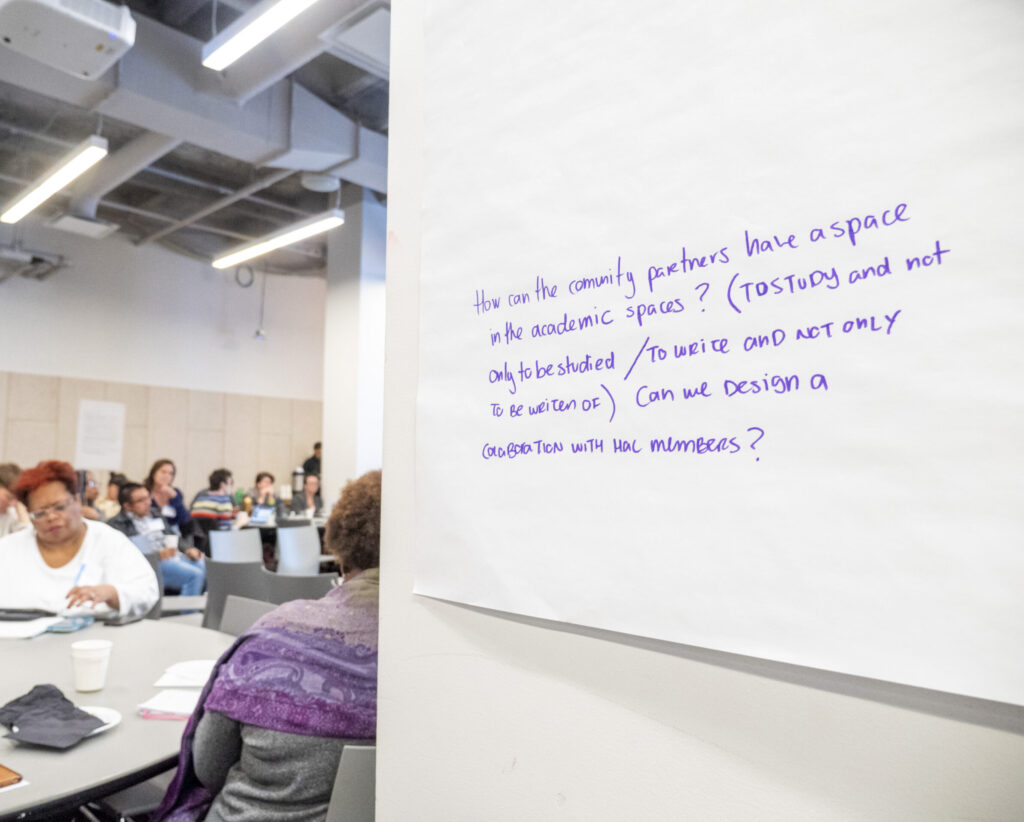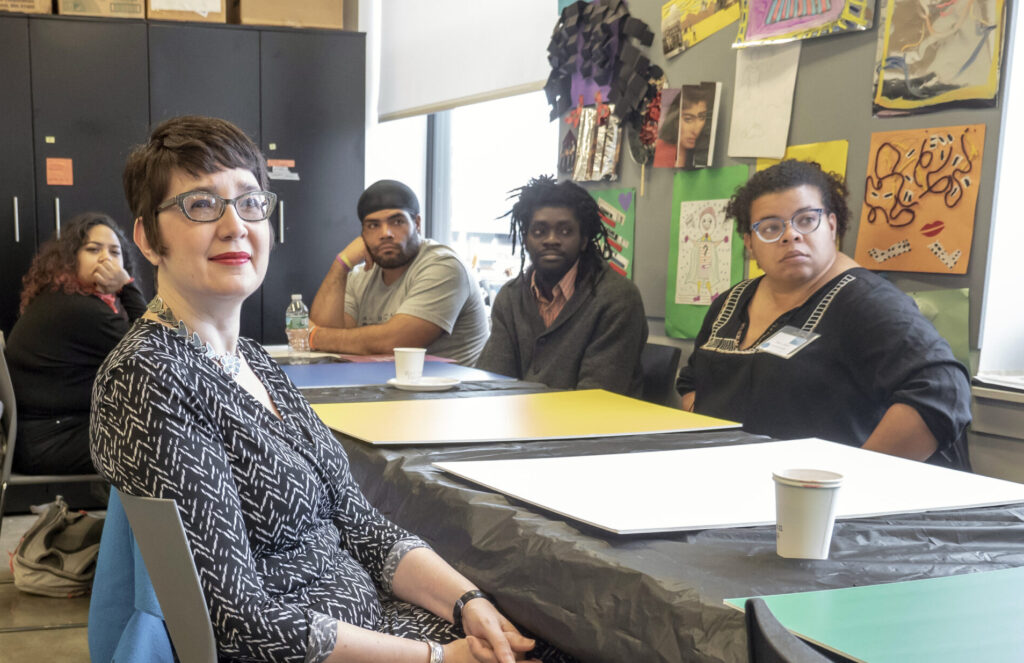Happening Now
HAL Translocal Learning Studio Begins This Fall!

The Humanities Action Lab is opening a studio for developing and expanding anti-racist, decolonial, and community-centered learning practices that activate history and memory for justice-centered movements and mutual aid in the current moment. This studio will be “translocal,” a core tenet of HAL that honors the unique circumstances, autonomy, and tools of hyperlocal organizing and supports building reciprocal learning relationships between these localities across the world.
The pilot “course” this fall, consisting of 6-8 online modular sessions, will include undergraduate/graduate students, members of community organizations, and faculty from HAL’s 20+ partner communities. Participants will engage as both teachers and learners, to collaboratively experiment with exercises, workshops, readings/media, and other forms that challenge what teaching and practicing justice-centered public history can and should be.
The “course” will include structures for intentional, reciprocal mentoring among students, faculty, and community organization representatives to facilitate a lasting learning community. It will emerge with a set of resources and model practices collaboratively designed by participants; and a syllabus and structure that will be refined for a spring 2021 version. Participants may also link their work in a collaborative project connecting their local histories and ongoing actions, building on the Climates of Inequality digital and traveling multimedia exhibit platforms created by students and EJ organizations in 20+ communities.
Please contact Leora Fuller at leorafuller@gmail.com if you have questions or need documentation to support getting credit from your academic institution.
Goals:
- Foster anti-racist, decolonial, and liberatory pedagogies, specifically around public history/memory for systemic change
- Reimagine public history/heritage for the current moment, including exploring what mutual aid and direct action storytelling can look like
- Facilitate translocal learning: collective learning in which participants are grounded in their localities but exchanging and learning together
- Model how to center community needs in the classroom, redefining university-non university collaborations
- Interrogate what “public engagement” looks like: Who are you working with and for? What change are you trying to create?
- Create a model of student- and community-centered public history that connects one’s own experience to structural oppression and systemic harm
- Create models of resource advocacy and distribution led by faculty within universities to challenge institutional harm and create lasting change
Structure:
- 6-8, 1.5-2 hour Zoom sessions
- Option to attend all sessions or individual sessions, synchronously or asynchronously
- Most sessions will be hosted by HAL; but some will be “field trips” into one participant’s space
Committed Core Participants to Date:
The below people are being invited to participate in multiple consecutive sessions.
- Community organization leaders:
- Anthony Diaz, Newark Water Coalition, Newark, NJ
- Claudia Navarro, WeCount, Homestead, FL
- Rosa Furumoto, Padres Pioneros, San Bernardino, CA
- Maria Lopez-Nunez, Ironbound Community Corporation, Newark, NJ
- Camille Mays, Peace Garden Project MKE, Milwaukee, WI
- Students (undergraduate and graduate) from:
- Florida International University, Literature
- Rutgers University-Newark, History, Sociology and Social Justice Minor
- University of Puerto Rico-Mayagüez, Literature
- Cal State University-Northridge, Chicana & Chinano Studies
- University of California Riverside, Public History
- University of Illinois-Chicago, Latin American and Latino Studies
- University of Massachusetts Amherst, Public History
- University of New Orleans, Public History and Social Justice programs
- Faculty:
- Rosa Cabrera, Adjunct Faculty in the Department of Anthropology, Graduate College, Latin American and Latino Studies, and Museum & Exhibition Studies University of Illinois at Chicago
- Ricia Chansky, Professor of literature, University of Puerto Rico-Mayagüez
- Catherine Gudis, Associate Professor of History, University of California, Riverside
- Valerie Johnson, Associate Professor of Political Science, Grace School of Applied Diplomacy, Critical Ethnic Studies, DePaul, College of Liberal Arts and Social Sciences
- Molly Mitchell, Raphael Cassimere Professor of History, Ethel and Herman L. Midlo Endowed Chair, and Director of the Midlo Center for New Orleans Studies, University of New Orleans
- Stevie Ruiz, Assistant Professor, Chicana and Chicano Studies, California State University, Northridge
Starting Schedule (subject to change):
Session 1 - Thursday, October 15th, 1:30-3pm EST
- Locating yourself and your history in relation to systemic power and histories of liberation and historical harm
- Creating reciprocal relationships among mentors and partners for co-creation and knowledge sharing: discussion of models, and establishing plan for the semester
- Community Harm, Transformative Justice, and Pod Mapping
Session 2 - Thursday, October 22nd, 1:30-3pm EST
- Mapping assets and spheres of influence for building and activating public memory: what do we have and who do we have access to?
Wednesday October 28, 5-6:15 pm EST
- “Field Trip” to Stevie Ruiz’s Environmental Justice and Chiana/o Communities class at Cal State University Northridge, featuring Lisa Park of UC Santa Barbara
Session 3 - Thursday October 29, 1:30-3pm EST
- Mutual Aid Storytelling - This session will be shaped by our participants who practice mutual aid in their efforts
Monday, November 2, 5-6:15pm EST
- “Field Trip” to Stevie Ruiz’s Environmental Justice and Chiana/o Communities class featuring Suzanne Pierre on Equity and Social Justice in Environmentalism
Session 4 - Thursday, November 12th, 1:30-3pm EST
- Connecting Environmental Justice and COVID: Learning, Teaching, and Acting on Histories, Legacies, Impacts
Wednesday, November 18th, 5-6:15pm EST
- “Field Trip” to Stevie Ruiz’s Environmental Justice and Chiana/o Communities class featuring Carolyn Finney, African Americans and the Great Outdoors
Session 5 - Thursday, December 3rd, 1:30-3pm EST
- This session will be shaped by our core participants out of our shared efforts
Session 6 - Thursday December 17th, 1:30-3pm EST
- This session will be shaped by our core participants out of our shared efforts

Outcomes We're Dreaming Towards:
- A set of resources for anti-racist and decolonial learning approaches and practices that activate history and memory for transformative direct action against oppression
- Collective project on mutual aid storytelling/public history for systemic change
- Reciprocal mentoring relationships (for core participants) and a lasting learning community